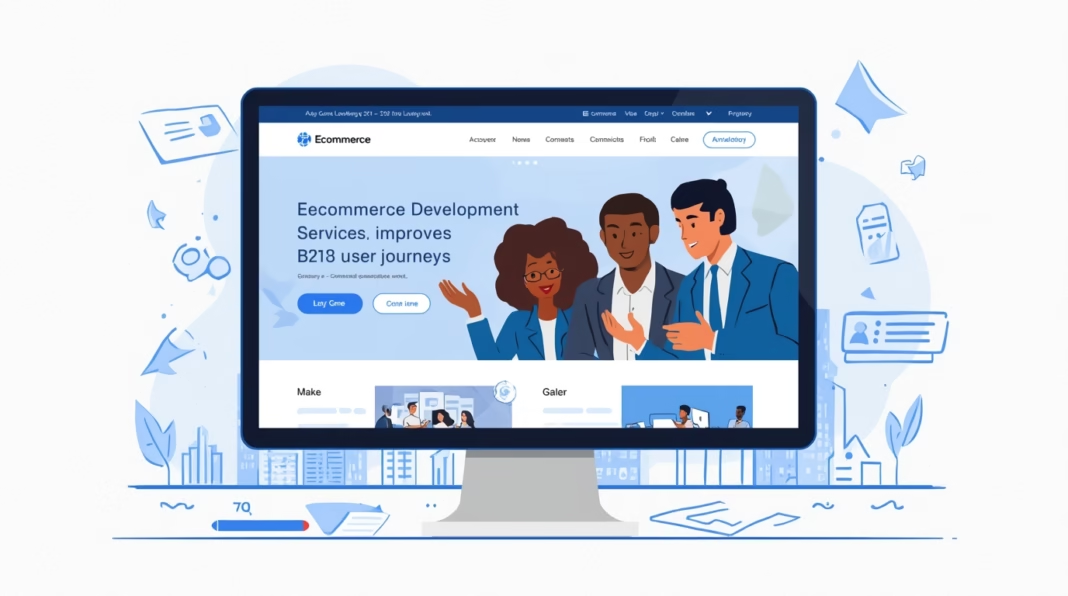The B2B buying process has undergone a radical transformation. Gone are the days when business purchases relied solely on phone calls, trade shows, and face-to-face meetings. Today’s B2B buyers conduct 57% of their research online before ever speaking with a sales representative. This shift has created both unprecedented opportunities and complex challenges for businesses looking to optimize their digital presence.
The complexity of B2B transactions—involving multiple stakeholders, longer sales cycles, and higher-value purchases—demands ecommerce solutions that go far beyond traditional B2C approaches. Understanding how specialized development services can transform these intricate user journeys is crucial for any business serious about digital growth.
The Unique Landscape of B2B User Journeys
B2B user journeys differ fundamentally from their B2C counterparts in ways that many businesses underestimate. While a consumer might make an impulse purchase in minutes, B2B buyers typically navigate through months of research, evaluation, and consensus-building before reaching a decision.
Consider a procurement manager searching for industrial equipment. They’re not just evaluating product specifications—they’re assessing vendor reliability, long-term support capabilities, integration possibilities, and total cost of ownership. This journey often involves multiple touchpoints across different departments, from initial research by junior staff to final approval by C-level executives.
The challenge lies in creating digital experiences that serve all these stakeholders effectively while maintaining a cohesive narrative throughout the extended decision-making process. This requires sophisticated development approaches that traditional ecommerce platforms simply cannot accommodate.
Mapping Complex Stakeholder Networks
One of the most significant ways ecommerce development services enhance B2B journeys is through sophisticated user role management and personalized experiences. Unlike B2C sites where personalization might involve product recommendations based on browsing history, B2B platforms must account for organizational hierarchies, purchasing authority levels, and departmental needs.
Advanced development frameworks create dynamic user experiences that adapt based on stakeholder roles. A technical evaluator might see detailed specifications, compatibility charts, and implementation guides, while a financial decision-maker receives cost analysis tools, ROI calculators, and budget planning resources. This level of customization requires deep technical expertise and strategic thinking about user experience design.
The most effective B2B ecommerce platforms also facilitate collaboration between stakeholders. This might include shared project spaces where team members can bookmark products, create comparison charts, and leave notes for colleagues. These collaborative features acknowledge the reality that B2B purchases are rarely individual decisions.
Streamlining Complex Product Configurations
B2B products often require extensive customization and configuration. Whether it’s enterprise software with multiple modules or manufacturing equipment with various specifications, the ability to guide users through complex product selection processes can make the difference between conversion and abandonment.
Professional development services create intuitive configuration tools that simplify complexity without sacrificing functionality. This might involve guided product selectors that ask relevant questions to narrow down options, visual configurators that show how different choices affect the final product, or compatibility checkers that ensure selected components work together seamlessly.
The key is transforming what could be overwhelming technical complexity into a logical, step-by-step process that builds confidence in the buyer’s decision. This requires not just technical development skills but deep understanding of industry-specific challenges and user psychology.
Advanced Search and Filtering Capabilities
B2B buyers often know exactly what they’re looking for, but finding it within extensive product catalogs can be challenging. Traditional keyword search falls short when dealing with technical specifications, model numbers, and industry-specific terminology.
Sophisticated ecommerce development incorporates advanced search technologies including semantic search, faceted navigation, and predictive text capabilities. These systems understand that a search for “corrosion-resistant pumps” should also surface products described as “anti-corrosive” or “chemical-resistant.”
More importantly, these search systems learn from user behavior patterns. If users frequently filter by specific certifications or compatibility requirements, the system adapts to surface these options more prominently. This continuous optimization improves the user experience while reducing the time needed to find relevant products.
Integration with Enterprise Systems
B2B buyers don’t operate in isolation—they work within established procurement processes, approval workflows, and enterprise resource planning systems. Effective ecommerce development services recognize this reality and build platforms that integrate seamlessly with existing business infrastructure.
This integration goes beyond simple data exchange. It involves creating workflows that respect organizational processes while reducing friction in the buying journey. For example, a platform might automatically route large purchases through approval workflows while allowing smaller transactions to proceed immediately.
API-driven architectures enable these integrations while maintaining flexibility for future needs. As businesses evolve their internal systems, their ecommerce platforms can adapt without requiring complete redevelopment.
Personalized Content and Resource Libraries
B2B buyers consume substantial amounts of educational content during their research process. They need technical documentation, case studies, implementation guides, and industry-specific resources. The most effective ecommerce platforms serve as comprehensive resource centers, not just product catalogs.
Development services that understand B2B dynamics create sophisticated content management systems that organize and present information based on user needs and journey stage. Early-stage researchers might see broad industry trends and educational content, while users closer to purchase receive detailed implementation guides and support resources.
This content personalization extends to communication preferences as well. Some users prefer detailed technical documentation, while others respond better to video demonstrations or interactive tools. Advanced platforms accommodate these preferences while maintaining consistent brand messaging.
Building Trust Through Transparency
B2B purchases involve significant risk, and buyers need confidence in their decisions. This requires transparency throughout the user journey, from pricing and availability to delivery timelines and support commitments.
Professional development services create systems that provide real-time information about inventory levels, lead times, and pricing tiers. They implement customer portal functionality that allows buyers to track orders, access purchase history, and manage service requests independently.
Trust-building also involves social proof adapted for B2B contexts. While consumer reviews focus on personal satisfaction, B2B social proof emphasizes measurable business outcomes, implementation success stories, and long-term partnership satisfaction.
Mobile Optimization for On-the-Go Decision Making
While B2B purchases may be complex, decision-makers are increasingly mobile. Procurement professionals research products during commutes, facility managers check specifications while on-site, and executives review proposals between meetings.
B2B mobile optimization differs significantly from B2C approaches. Instead of focusing primarily on quick purchases, B2B mobile experiences prioritize information access, collaboration tools, and offline functionality. This might include the ability to download product specifications for offline viewing or mobile-optimized approval workflows that keep projects moving even when stakeholders are traveling.
Working with an experienced ecommerce website development company ensures these mobile experiences maintain full functionality while adapting to smaller screens and touch interfaces. The challenge lies in preserving the depth of information and functionality that B2B users require while creating intuitive mobile interfaces.
Data-Driven Journey Optimization
The extended nature of B2B sales cycles provides unprecedented opportunities for data-driven optimization. Unlike B2C transactions that may conclude in a single session, B2B journeys generate rich behavioral data over weeks or months.
Advanced development services implement comprehensive analytics frameworks that track user behavior across multiple touchpoints and sessions. This data reveals patterns in how different types of buyers navigate the platform, which content proves most valuable at different journey stages, and where potential customers typically encounter friction.
Companies like Devsinc understand that successful B2B ecommerce isn’t just about building functional websites—it’s about creating platforms that evolve based on user behavior and business needs. Their development approach incorporates feedback loops that enable continuous improvement based on real user data.
Future-Proofing B2B Ecommerce Platforms
The B2B digital landscape continues evolving rapidly, driven by generational changes in the workforce and advancing technology capabilities. Development services that understand this evolution build platforms with scalability and adaptability as core principles.
This includes modular architectures that allow new functionality to be added without disrupting existing operations, API-first designs that enable integration with emerging technologies, and flexible content management systems that adapt to changing communication preferences.
The most forward-thinking platforms also incorporate emerging technologies like artificial intelligence for predictive recommendations, augmented reality for product visualization, and blockchain for supply chain transparency.
Measuring Success in B2B Contexts
Traditional ecommerce metrics like conversion rates and average order values tell only part of the B2B story. Success in B2B ecommerce requires understanding metrics like customer lifetime value, sales cycle compression, and stakeholder engagement across extended journey timelines.
Professional development services implement comprehensive measurement frameworks that track both quantitative metrics and qualitative improvements in user experience. This might include measuring how platform improvements affect the time required to complete complex configurations or tracking how self-service capabilities reduce support burden while improving customer satisfaction.
The goal isn’t just increasing immediate sales but building platforms that strengthen long-term business relationships and create competitive advantages in increasingly digital B2B markets.
Conclusion: The Strategic Imperative
B2B ecommerce development represents far more than technical implementation—it’s a strategic initiative that can fundamentally transform how businesses interact with their customers. The companies that recognize this opportunity and invest in sophisticated development services will capture increasingly digital B2B markets while competitors struggle with inadequate platforms.
Success requires understanding that B2B users have unique needs, complex decision-making processes, and high expectations for platform functionality and reliability. Meeting these needs demands technical expertise, strategic thinking, and continuous optimization based on real user behavior.
The transformation of B2B commerce is accelerating, and the platforms built today will define competitive positioning for years to come. The question isn’t whether to invest in professional ecommerce development services, but how quickly businesses can implement solutions that meet the evolving expectations of modern B2B buyers.


